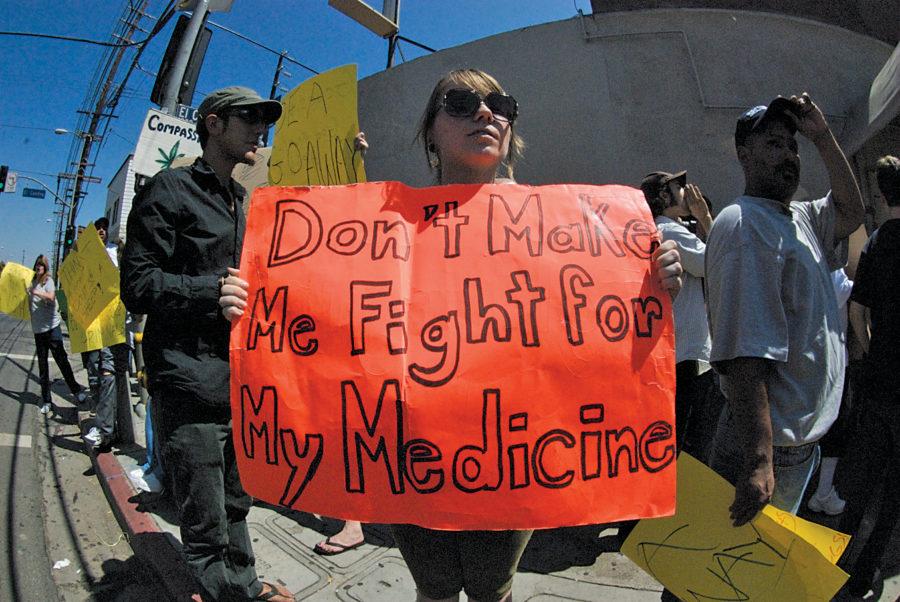Public opinion says legalize it
Courtesy photo: Wikimedia Commons
Support for the legalization of marijuana comes from those who are both medicinal and recreational users. The fact that it does not have adverse affects is one of the main arguments supporters use.
October 9, 2010
On Oct. 6, Dustin Moskovitz, one of the co-founders of Facebook, confirmed that he had donated $50,000 to California’s Proposition 19 — or the “Regulate, Control and Tax Cannabis Act of 2010.” Sean Parker, co-founder of Napster and a former president of Facebook, followed suit, donating $100,000 to the cause. Even the Iowa State Daily Editorial Board endorsed the legalization of marijuana, albeit only for medicinal purposes.
Thankfully, our government is slowly recognizing that marijuana provides relief from pain, nausea and other symptoms for many individuals who have not been treated successfully with conventional medications. It is effective in reducing nausea induced by cancer chemotherapy, stimulating appetite in AIDS patients, reducing intraocular pressure in people with glaucoma and reducing muscle spasticity in patients with neurological disorders.
At the time of writing, medical marijuana is legal in Washington D.C., and in 15 states: Alaska, California, Colorado, Hawaii, Maine, Michigan, Montana, Nevada, New Jersey, New Mexico, Oregon, Rhode Island, Vermont, Virginia and Washington. I am hopeful that California will soon join that list, and I encourage the Iowa General Assembly to heed the Iowa Board of Pharmacy’s recommendation that marijuana be allowed for medicinal usage.
Yet there are many reasons why cannabis should be legalized outright. Prohibition has failed to control the use and domestic production of marijuana; millions of Americans smoke weed. In fact, it is the biggest cash crop in the United States.
Many American adults prefer marijuana to the use of alcohol as a mild and moderate way to relax. They use marijuana because they choose to, and one of the reasons for that choice is their personal observation that the drug has no practical liabilities and has easy-to-manage side effects.
No one has died from merely smoking weed, as marijuana does not have adverse effects; it is well established that marijuana is not toxic to humans. There is no convincing scientific evidence that weed causes psychological damage or mental illness. In fact, marijuana overdoses are impossible, in that one cannot absorb a lethal amount of THC in the body from purely smoking weed. Marijuana is not highly addictive, unlike the likes of alcohol or tobacco. As such, it is unfair to treat marijuana users more harshly under the law.
For more than 25 years, researchers have searched for a marijuana-induced “amotivational syndrome” and have failed. People who are intoxicated constantly, regardless of the drug, are unlikely to be productive members of society. There is nothing specific about marijuana that causes people to lose their drive or ambition. In lab studies, subjects given high doses of marijuana for several days or even several weeks exhibit no decrease in work motivation or productivity. Among working adults, marijuana users tend to earn higher wages than non-users. College students who use marijuana have the same grades on average as nonusers.
A legal market for marijuana would reduce sales and use. Obscene profits can be made from illegal marijuana sales. If there were a legal market for it, dealers would have to adjust their prices accordingly, due to competition. Over time, the use of weed would go down, due to the elimination of the “forbidden fruit” aspect.
In addition, marijuana’s illegality makes foreign cultivation and smuggling extremely profitable, sending billions of dollars overseas in an underground economy while diverting funds from productive economic development here at home. In addition, a legal market would reduce exposure to other drugs in the illegal market.
Many argue that marijuana is a gateway drug. This is not true, and there is no evidence to support the assertion that a causal link exists. However, I would agree that the less contact with shifty drug dealers, the better. The legalization of marijuana would bring sales out in the open and eliminate the need to deal with unscrupulous individuals.
The number of persecutions and arrests for marijuana are ridiculous. Our justice system spends far too much money processing people for marijuana-related charges — billions of dollars, wasted on this needless prohibition. We are already burdened with an overcrowded prison system; we should not be arresting people for the possession of or the use of weed. Instead, the space should be used for actual criminals, like murderers and rapists.
The Controlled Substances Act — part of the Comprehensive Drug Abuse Prevention and Control Act of 1970 — is the law that makes marijuana illegal on the federal level. Marijuana should be eliminated from that law, as those who are legally considered adults should be able to buy and use the drug. Indeed, cannabis should be legalized for the numerous reasons I outlined above.







